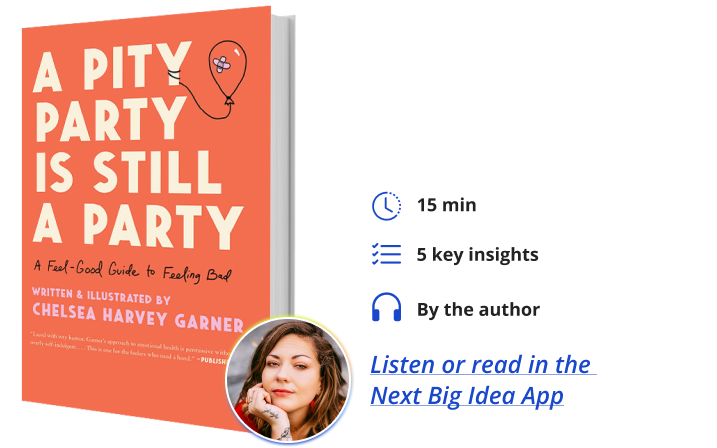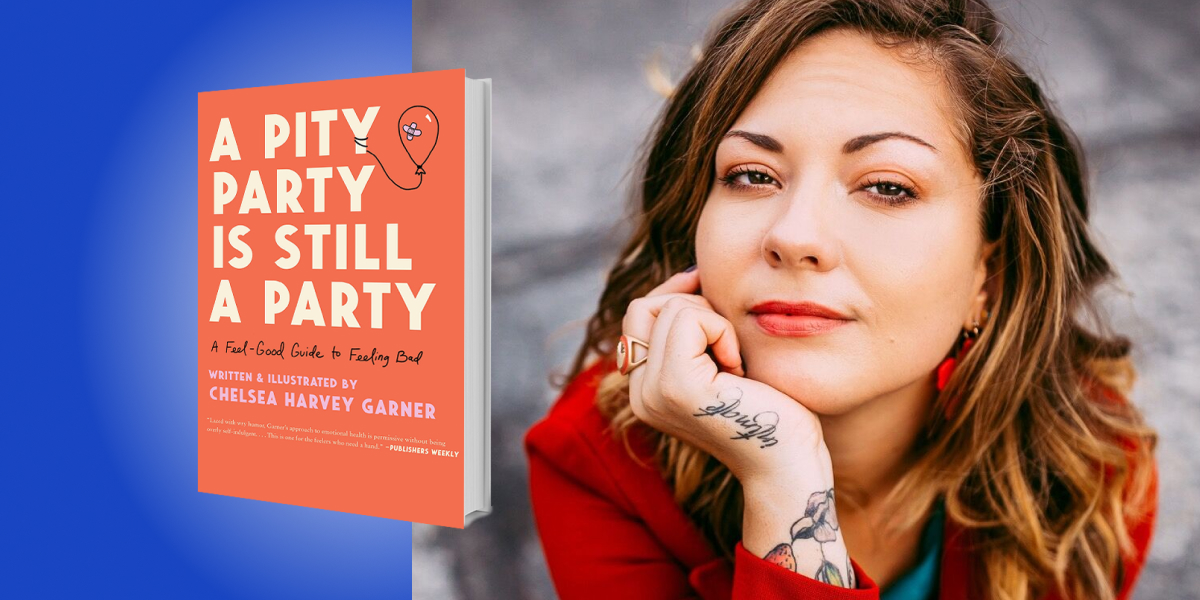Chelsea Harvey Garner is a psychotherapist and founder of Big Feels Lab, a nonprofit promoting collective mental health. Below, Chelsea shares 5 key insights from her new book, A Pity Party Is Still a Party: A Feel-Good Guide to Feeling Bad. Listen to the audio version—read by Chelsea herself—in the Next Big Idea App.

1. Enjoy your problems.
As a therapist, people often come to me hoping I can solve their problems. They don’t usually say this explicitly, but on some level, many of us assume that our lives are challenging because we’re doing something wrong. Worse, we often take pain as a sign that there’s something wrong with us. Naturally, we want therapy to fix us so we can walk away with a cleaner, sparkly-er life that more closely resembles the lives of the people we hate-follow on social media.
As much as I wish I could offer that, I don’t think it’s something I can deliver on, and it’s not because I suck at my job. (I happen to think I’m a pretty decent therapist!) I just don’t think it’s possible. Whether or not our personal experience has been traumatic, being alive is hard. The world is a challenging place, both in this modern era and also always. Even though life can be pretty rough, feeling bad is not a sign that we’ve missed out on some secret knowledge others have or that we’re being punished by a cosmic force. It’s just part of the deal. When we embrace that suffering is intrinsic to being alive, we feel more capable of meeting the inevitable challenges that arise and even finding meaning and joy in those dark moments.
I invite a general shift of attitude away from the stance where we’re constantly sorting through what’s happening and accepting what we like, and denying the rest. There are dangers that come with toxic positivity. An overemphasis on an optimistic outlook is dangerous both at the personal level and at the social level. Repression and denial keep us from developing the skills necessary to become mature. By adopting a more open, curious attitude, we can show up more fully for reality as it is.
2. Trust your feelings.
There is a common misunderstanding that emotions are inherently untrustworthy. A lot of clients in my therapy practice really believe that they feel the wrong things in the wrong amount at the wrong time. Furthermore, many of us actually believe emotions are innately unproductive, even a waste of time. We tend to think that anytime we’re feeling something, we’re not being reasonable. This is an inaccurate understanding of what emotion is.
“Emotion is not a distraction from logic, it’s a primary way we take in information.”
Emotion is not some strange occurrence that arises randomly or sporadically, compromising our ability to think. Sure, sometimes we get flooded with anxiety or depression that interferes with our ability to function, but this has just as much to do with the quality of our thoughts as our emotions. Humans are profoundly emotional creatures; we’re experiencing some form of emotion almost all of the time. Emotion is not a distraction from logic, it’s a primary way we take in information. When we believe emotions are at odds with our ability to reason, we try to repress them. This cuts us off from our experience and intuition as well as our ability to connect. Thinking and feeling work in tandem, and we need access to both to make informed decisions, connect with others, and understand what matters in life.
We also see this collective distrust of emotion playing out at the social scale, making us skeptical of anyone who is overtly hurting. When we regard painful emotions as a sign of instability, we automatically discount the perspective of anyone who is obviously suffering. It’s not difficult to see how this can become problematic at the political level. If a group of people are more overtly struggling and that means they’re irrational, we automatically discredit their views and justify ignoring their needs. This also positions the people who are having the easiest time (or seemingly being “less emotional”) as the most rational. This is dangerous and rooted in a misunderstanding of what emotion is and what it does.
We need to radically alter the way we think about emotion. We need to learn to trust and honor the validity, even painful ones, both in ourselves and each other. We need to understand that emotions are necessary, safe to feel, and often extremely reasonable responses to the events of our lives.
3. Be needy.
A lot of people talk about how difficult it is for them to feel needy. We’re living through a loneliness epidemic, with more people today feeling isolated than ever before. This is terrible for our mental health. Even still, many of us feel terrified to burden others with our need for connection. For those of us in the U.S., this is reinforced by the individualistic culture we live in and the messages that come along with it. Our whole lives we are encouraged to be independent and to feel ashamed of needing others.
It’s extremely natural and healthy for humans to need each other. This is true in big and small ways and at every stage of life. Community care is how we’ve survived throughout history, and isn’t even unique to humans. All life on earth thrives through relationships of mutual benefit. If we’re going to feel better, we need to develop a friendlier attitude toward our needs and learn to express them in relationships. This will mean embracing the embarrassment of opening up about our struggles.
“Our whole lives we are encouraged to be independent and to feel ashamed of needing others.”
I don’t just encourage this kind of openness with therapists and close friends, but also with colleagues and people we just started dating. I’m not suggesting we trauma dump on our cashier at the gas station or grocery store. At the same time, it would be a lot less weird for us to open up if we all got more comfortable talking about pain.
We need to get more comfortable hearing about others’ struggles without feeling like we have to resolve them. People don’t usually want advice, they want to feel heard. We need to be with each other in hard moments without trying to cheer each other up. In allowing others to be authentic with us, we often find that both the speaker and the person being heard get their need for connection met right away.
4. Practice rituals.
The word ritual can be a bit controversial. When I talk about ritual, I don’t just mean doing strange magic in the woods (though I totally support you if that’s what you want to do). I am referring to simple rituals, like having a quiet cup of coffee every morning (without your phone, preferably!) or meditating for five minutes before bed.
Humans have always practiced rituals together. Whether they were tied to religion or not, we have learned to process change through group activities that allowed us to fully emote and lose ourselves. When we come together in this way, we can experience a state of flow, which is a primary means of releasing stress and fostering consistent well-being. Through group rituals, we can also access a state of transcendence called Collective Effervescence. This state can border on euphoria, ecstasy, or a sense of spiritual breakthrough, even if the event is focused on grieving a loss or major change. These rituals don’t have to be big, formal ceremonies. They can take the form of concerts or even protests.
These events help us feel like part of something bigger than ourselves. They give us a break from our usual state of feeling like an individual person facing the world alone and help us dissolve into a state of belonging and meaning. Group rituals help us release the pressure to think critically and remain in control at all times. Rituals offer many benefits for our physical and mental health. Even better, they allow us to bond with community. Through group rituals, people from different political and cultural backgrounds can find themselves feeling bonded.
In addition to discussing the benefits of ritual, you can create a Cry Diary or host a Not Everybody’s Cup of Tea Party with friends. Some of these were inspired by practices I learned through communities I’m a part of, and some I just made up. Regardless of which you’re drawn to, it’s important to feel empowered to choose rituals that work for you. These days, a lot of us feel disconnected from a lineage or religious practice. Many of us didn’t grow up being taught traditions that were passed down through generations. Even if we did, we may find that those practices don’t work for us anymore as adults. In these cases, we can simply invent rituals to meet our needs. We can research or remix the traditions of our ancestors.
“Through group rituals, people from different political and cultural backgrounds can find themselves feeling bonded.”
Studies show that even rituals we make up on the spot can produce similarly beneficial effects, helping us set and achieve goals and cope with uncertainty and change. Rituals are extremely good for us and are even more powerful if they help us feel connected to community and the living earth around us.
5. Embrace the broken world.
At the broadest level, learning to enjoy life means learning to embrace the broken world. It means forgiving the world for being such a flawed, confusing place. We don’t understand why so much suffering happens here and we likely won’t ever figure that out. That’s okay. We don’t need those answers to love being alive.
This, however, doesn’t mean we should just roll over and tolerate injustice. By embracing the true state of the world, it actually becomes easier for us to discern what we actually can and cannot do to change things for the better. There are many aspects of life we can control and many that we can’t. Learning to tell the difference requires self-awareness, emotional flexibility, and ultimately, maturity. Learning to love the world as it is, with all its messiness, helps us earn that wisdom and discernment.
The fact is that we will never find that perfectly safe place. Instead, we can allow our confusion and grief to join us with others. It is healing to connect to the role models and ancestors who have overcome the same hardships we’re living through, and for connecting to the wild, natural world. The earth is alive, and human drama is not the only thing taking place. Nature is not just some boring place where plants are growing silently. It’s teeming with new life forms, connections, and courage. We are a part of that, and prioritizing practices that help us remember that every day can do wonders for our mental health.
There’s a lot going on in the world and surely in your life too, but we can always support each other through hard times. We don’t have to do it all alone, and it doesn’t have to be miserable.
To listen to the audio version read by author Chelsea Harvey Garner, download the Next Big Idea App today:
































